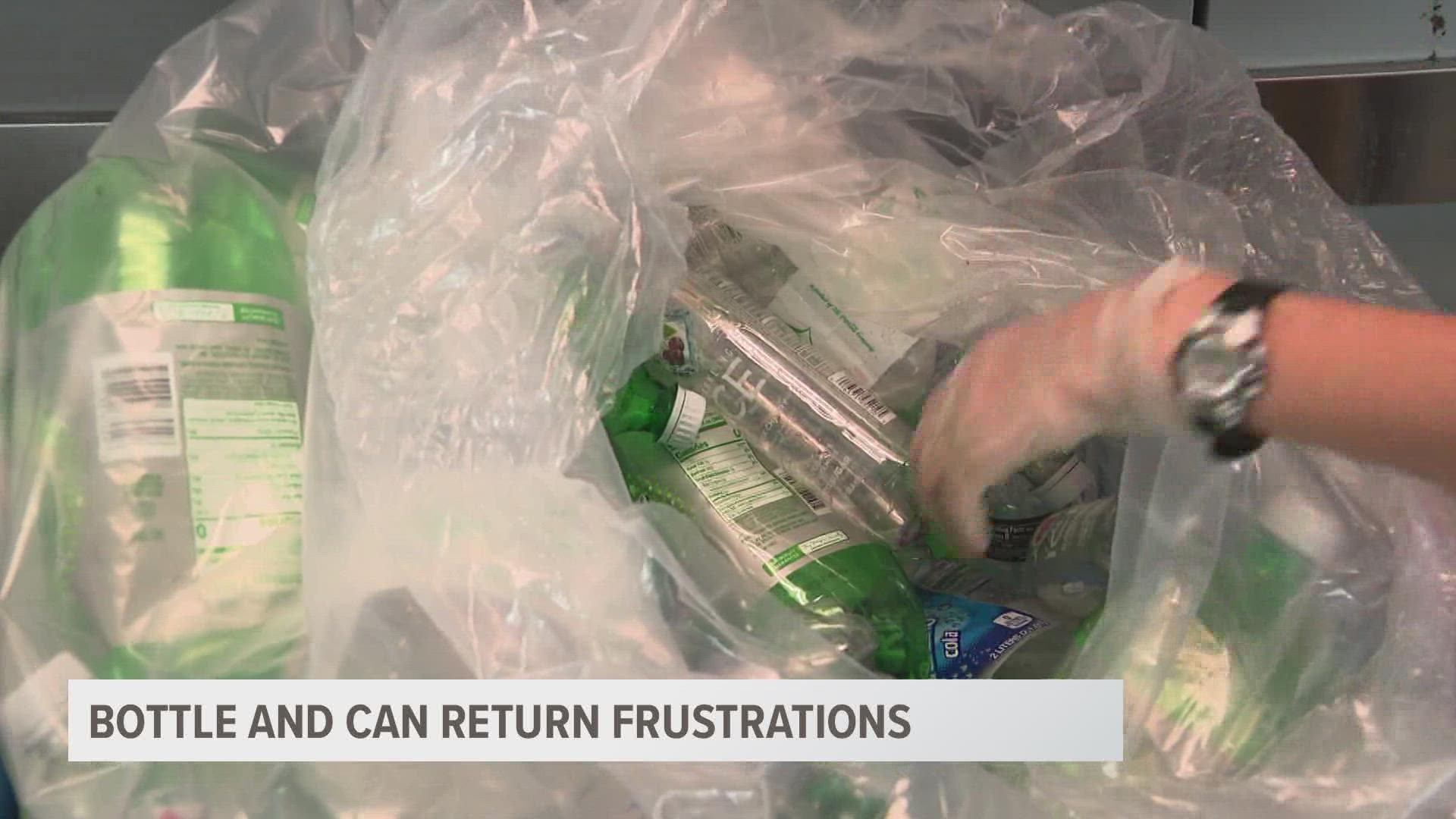MUSKEGON, Mich. — When you buy a drink in the state of Michigan, most of the time the bottle or can it came in has an added 10 cents at the register. Most of us don't balk at that, knowing we can return it later and recoup that deposit. Not every store is honoring that expectation, though, as our 13 ON YOUR SIDE team found out in Muskegon.
We received a tip from Muskegon viewer Heath Moore. He was upset because the gas stations and party stores near him were not accepting returnable items they had sold.
"There are a lot of small retailers that aren’t doing that, they’re refusing to take bottles and cans back at all, or there putting limits in place that are below the limit set by the state." Moore said. "Everybody’s got their own quirks and rules, but none of them are following the state law."
He gave us examples of four stores, and we went to see for ourselves.
Of those four retailers, three were gas station convivence stores, and each one gave different results. The first refused to accept anything back, regardless of whether or not they sold the product. They said since the pandemic, they hadn't taken any returns and didn't plan to start again.
That is directly breaking Michigan's Beverage Containers Initiated Law of 1976, more commonly referred to as the Bottle Bill. The program was halted briefly in June of 2020, but was reinstated by October of that same year. A representative from Michigan's treasury department says there are no current restrictions on the law.
The second gas station we visited took back all but one type of can we had, which was not an item they stocked. That puts them in good standing with the state law, especially since they accepted items that weren't stocked on the shelves.
The state's website says "retailers are required to accept crushed containers if they are clean, sold by the retailer, and can be identified as a Michigan returnable beverage container." Items not sold by the retailer are not specifically required to be collected.
The third gas station convenience store was again in violation of the Bottle Bill. The cashier said they only accept bottles and cans for return between 11 a.m. and 4 p.m. When we presented a bottle for return, he said they don't collect those. When looking in their refrigerators, that same bottle was available for purchase.
The fourth location was a party store, which had a similar result as the third gas station. The cashier said they only accept until 4 p.m., because the person responsible for collection "goes home." Both of those stores are breaking the Bottle Bill, as time restrictions are not listed as something businesses can impose.
The inconsistency is something Moore finds almost as frustrating as being told he can't return cans in general. He wants to be able to bring items to stores within walking distance of his house. Driving to a Meijer or Walmart is a few miles away for Moore, and as gas gets more and more expensive, he says it get more discouraging.
"I would like to see the state step in and start enforcing the law," Moore said. "If it's the retailers that won't follow it, they need to start passing out some fines, or if it’s a place that sells liquor, if they continually refuse to follow the law, pull their liquor license."
Moore and other residents we talked to acknowledge the chance of more enforcement hurting smaller retailers. He says he's more likely to go somewhere he knows will accept his bottle and can returns.
"It would only hurt them at their own behest," he said. "They have the opportunity to follow the law, if they don’t want to follow the law, that’s their own choice, and if it puts them out of business, that’s their own fault."
Twenty five percent of unclaimed deposits from the Bottle Bill are given back to retailers. The other 75% go to the state, and from there, 80% is deposited into the Cleanup and Redevelopment Fund, 10% is deposited into the Community Pollution Prevention Fund and 10% goes into a state-managed trust fund.
A state spokesperson says the best course of action to get stores to accept returns is to report the ones that don't. You can file those complaints with the Attorney General's Consumer Protection division.
►Make it easy to keep up to date with more stories like this. Download the 13 ON YOUR SIDE app now.
Have a news tip? Email news@13onyourside.com, visit our Facebook page or Twitter. Subscribe to our YouTube channel.

